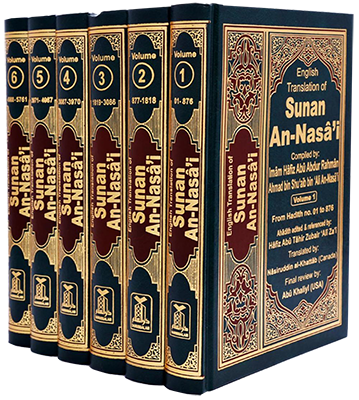By Ahmad ibn Shu'ayb an-Nasa'i (6)
| Title | ||||
|---|---|---|---|---|
| Sunan an-Nasa'i Vol. 1 |
|
|
| |
| Sunan an-Nasa'i Vol. 2 |
|
|
| |
| Sunan an-Nasa'i Vol. 3 |
|
|
| |
| Sunan an-Nasa'i Vol. 4 |
|
|
| |
| Sunan an-Nasa'i Vol. 5 |
|
|
| |
| Sunan an-Nasa'i Vol. 6 |
|
|
|
Details
Sunan an-Nasa'i is a collection of hadith compiled by Imam Ahmad ibn Shu'ayb an-Nasa'i. His collection is unanimously considered to be one of the six canonical collections of hadith (Kutub as-Sittah) of the Sunnah of the Prophet (ﷺ). It contains roughly 5761 hadith (with repetitions) in 51 books.
This is an abdrigement of a much larger work by an-Nasa'i known as Sunan al-Kubra which explains why this book is commonly known as Sunan as-Sughra. It has also been referred to as al-Mujtaba and Mujtana.
Those Who Narrated the Sunan From Imam an-Nasa'i
Ibn as-Sunni narrated the smaller Sunan; Sunan as-Sughra or, Al-Mujtaba from Imam an-Nasa'i. He is Abu Bakr Ahmad bin Muhammad bin Ishaq Ad-Dinawari, who died in 364 after Hijrah.
The most popular narrators of Sunan al-Kubra from Imam an-Nasa'i are al-Hasan bin Rashiq al-Askari (d. 370), Hamzah bin Muhammad al-Kinani (d. 357), Abul-Hasan Ibn Hayyuwyah (d. 366), Ibn al-Ahmar of Al-Andalus (d. 358), and some others.
Important Traits of Sunan as-Sughra
Imam an-Nasa'i was well-known for his knowledge in the various fields of Hadith and its narrators. Some scholars consider his compilation to have the least number of defective or weak narrations among the Four Sunan.
Sunan as-Sughra contains a number of repetitive narrations, more similar to the Sahih of Al-Bukhari than the remainder of the Six in that regard. Imam an-Nasa'i often cites the same narration in various chapters to show what is narrated as proof for different topics. In some cases he uses the same Hadith under chapter headings that mention opposite points. For example, in chapter 45 of the Book of Purification, entitled: "Leaving Any Restriction on the Amount of Water," he narrated the story of a Bedouin who urinated in the Masjid, and the Messenger of Allah (ﷺ) called for a bucket of water to pour over the area. By the chapter heading, it is clear that the meaning is that the amount of water to clean the area was not restricted to a minimum quantity. Later, in the Book of Water, chapter 2, entitled: "Restricting the Amount of Water" he narrated the same Hadith but this time, the apparent indication is the opposite. In other words, "a bucket" is the minimum amount of water to clean the area. Cases such as this are common, wherein he repeats the same narration to prove another inference.
Al-Mujtaba contains a noticeable method of subdivision of topics when compared to the remainder of the Six Books. Meaning that Imim an-Nasa'i has included more chapter headings indicating more subtle points between the more commonly indicated points, in the more commonly mentioned chapter headings of the others among the Six. It is as if he considered how they named the chapters for these narrations, and found that in between this and that there should be these additional chapters, since these narrations can be used to support these additional points as well. This becomes clear to anyone who has read all of the Six Books, and conlpared in which chapters each of the compilers included this or that narration, as well as the grouping of related chapters.
For example, in the case of narrations dealing with not facing the Qiblah when relieving oneself (see Hadith 20-23), we find one or perhaps two chapters in Sahih al-Bukhari, one in Sahih Muslim, two in Sunan Abu Dawud, two in Sunan at-Tirmidhi, two in Sunan Ibn Majah, and four in Al-Mujtaba - while there are only two in Sunan al-Kubra. One would observe from comparing all these that in Al-Mujtaba, he has the additional chapter: "The Command to Face Toward the East or the West When Relieving Oneself" and none of the others among the Six has named a chapter with a "command" related to this topic.
Such cases of additional chapter headings for repeated narrations indicate his vast understanding or (Fiqh), and this is among the important observations of the scholars about him and his book.
On the other hand, missing from Al-Mujtaba are the Books of Knowledge, Tafsir, and various books on manners, and many other important topics that are mentioned in the remainder of the Six, and some of which are included in Sunan al-Kubra.
Commentaries on the Sunan
- Sharh Sunan an-Nasa’i by Allamah Siraj-ud-Deen ibn al-Mulqin.
- Sharh Sunan an-Nasa’i by Allamah Muhammad ibn Abdul-Hadi as-Sindi.
- Zahir ar-Riba Alal-Mujtaba by Allamah Jalalud-Deen as-Suyuti.
- Ta’leeqat as-Salafiyyah Ala Sunan an-Nasa’i by Shaykh al-Allamah, Muhammad Ataaullaah Haneef Bhojiyani.
- Ta’leeqat Ala Sunan an-Nasa’i by Allamah Shams ul-Haqq Adheemabadi.
- Ta’leeqat Alas-Sunan an-Nasa’i, by Shaykh Abu Abdur-Rahmaan Muhammad Funjabi.
- Dhakheerat al-‘Uqbah fi Sharh al-Mujtaba by Shaykh Muhammad ibn ‘Ali ibn Adam ibn Musa al-Ithiyobi, 40 Volumes.
